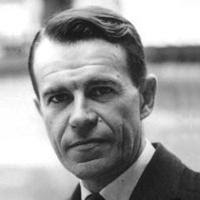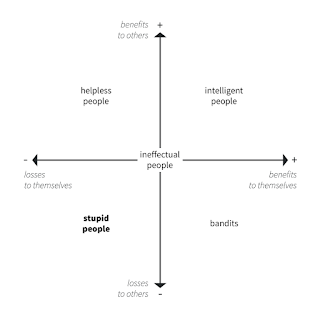Professor famous for treatise on ‘stupidity’
 |
| Carlo Cipolla's tongue-in-cheek book about human stupidity became a bestseller in Italy |
He was one of the leading economic historians of the 20th century and wrote more than 20 academic books on economic and social history but also on such diverse subjects as clocks, guns and faith, reason and the plague in 17th century Italy.
Yet it was for his humorous treatise, The Basic Laws of Human Stupidity, that he became famous. The book, written very much tongue in cheek, became a bestseller in Italy after it was published in 1976.
In it, Cipolla produced a graph that divided the human species into four types, each sharing one characteristic of another type.
He proposed that there are (a) bandits, whose actions bring benefits for themselves but losses for others; (b) intelligent people, whose actions bring benefits for themselves and for others; (c) naive or helpless people, whose actions bring benefits for others but who tend to be exploited and therefore incur losses for themselves; and (d) stupid people, whose actions result not only in losses for themselves but for others too.
His Five Laws of Human Stupidity argued that everyone underestimates the number of stupid people in society, that certain people had a strong likelihood of being stupid irrespective of other characteristics, that a stupid person inevitably causes losses to other people while deriving no gain from his or her actions, that non-stupid people repeatedly underestimate the damage likely to result from dealing or associating with stupid people, and that because of the lack of predictability and logic in a stupid person’s behaviour, a stupid person was more dangerous than a bandit.
 |
| The matrix that Cipolla included in his Basic Laws of Human Stupidity was something like this |
He studied political science at Pavia University but thanks to one of his professors he discovered his passion for economic history, which he subsequently studied at the Sorbonne and the London School of Economics.
After obtaining his first teaching post in economic history in Catania in Sicily at the age of 27, he embarked on an academic career that would see him appointed to positions at the universities of Venice, Turin and Pavia, the European Institute in Florence and the Scuola Normale Superiore in Pisa.
He began teaching at UC Berkeley in 1959 and, for more than 30 years, Cipolla and his American-born wife Ora divided their year between Berkeley, where they would spend the late summer and autumn, and Pavia, to which they returned for spring and early summer.
Cipolla was a member of the Royal Historical Society of Great Britain, the British Academy, the Accademia dei Lincei, American Academy of Arts and Sciences and the American Philosophical Society of Philadelphia. He was awarded the Premio della Presidente della Repubblica in Italy, and the Premio Balzan, as well as honorary degrees in Italy and Zurich, Switzerland.
His wide range of interests was evident in his passion for collecting as well as academic study. His homes were filled with impressive collections of ancient coins, old clocks, 18th century Italian paintings and Roman surgical instruments among other things.
Cipolla died in Pavia in 2000 at the age of 78, having for many years suffered from Parkinson’s Disease.
 |
| The Certosa di Pavia, which dates back to 1396 |
Pavia is a city in Lombardy, about 46km (30 miles) south of Milan. Its university was founded in 1361 and was the sole university in the Duchy of Milan until the 19th century. Its alumni include explorer Christopher Columbus, physicist Alessandro Volta and the poet and revolutionary Ugo Foscolo. Pavia is also famous for its Certosa, a magnificent Renaissance monastery complex north of the city that dates back to 1396 and includes a number of important sculptures and frescoes. A pretty covered bridge over the River Ticino leads to Borgo Ticino, where the inhabitants claim to be the true people of Pavia.
| The Palazzo dei Cavalieri, main seat of the Scuola Normale Superiore in Pisa |
The Scuola Normale Superiore - known and the Scuola Normale Superiore di Pisa until it was expanded to include faculties in Florence in 2014 - is often known in Italy simply as the Normale. Opened in 1810, its origins are in the Napoleonic era, when it was the equivalent of France’s École normale supérieure. The adjective "normal" was used in the sense of teaching societal “norms". In the 19th century, teachers' training schools were called "normal" schools for this reason. Many scientists, researchers and intellectuals, as well as prominent public figures, including two Presidents of Italy, were students there. It admits only a relatively small number of students per year and is seen as one of the most prestigious universities in Italy.
More reading:
The University of Pavia professor known as the 'father of criminology'
Alessandro Volta - the scientist who invented the first electric battery
Ugo Foscolo - poet and revolutionary
Also on this day:
1702: The birth of landscape painter Francesco Zuccarelli
1944: The birth of fashion designer Gianfranco Ferré
Home